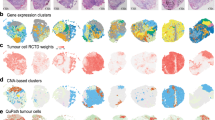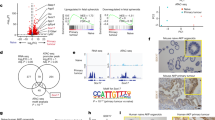Abstract
The teratocarcinoma-derived growth factor-1 (TDGF-1) gene codes for a 188-aminoacid glycoprotein that shares structural homology with the epidermal growth factor (EGF) family of growth factors. TDGF-1 is highly expressed in the undifferentiated embryonal carcinoma stem cell line NTERA2 clone D1 (NT2/D1) and its expression is downregulated in response to differentiating agents such as retinoic acid (RA) and hexamethylen-bisacetamide (HMBA). To assess the role of TDGF-1 in the onset and/or progression of human germ cell tumors, we analysed TDGF-1 expression by Northern blot and immunostaining in a panel of 59 human germ cell tumors of different histological origins. We show that TDGF-1 expression is markedly elevated in a subset of human testicular germ cell tumors as compared to normal testes. TDGF-1 overexpression occurs in about 100% of tumors with non-seminomatous phenotype, such as embryonal carcinomas and malignant undifferentiated teratocarcinomas. To address the questions of how TDGF-1 (previously called CRIPTO) may affect the growth and/or the differentiation of embryonal carcinoma cells, we have characterized the effects of exogenous recombinant TDGF-1 protein on the proliferation rate and differentiation potential of NT2/D1. Exogenous TDGF-1 protein stimulated DNA synthesis and cell proliferation in both undifferentiated and differentiated NT2/D1 cells. However, TDGF-1 protein treatment was unable to block differentiation induced by both RA and HMBA. These results suggest that TDGF-1 growth factor may represent an autocrine growth factor that may be involved in the process of development of testicular neoplasms.
This is a preview of subscription content, access via your institution
Access options
Subscribe to this journal
Receive 50 print issues and online access
$259.00 per year
only $5.18 per issue
Buy this article
- Purchase on Springer Link
- Instant access to full article PDF
Prices may be subject to local taxes which are calculated during checkout
Similar content being viewed by others
Author information
Authors and Affiliations
Rights and permissions
About this article
Cite this article
Baldassarre, G., Romano, A., Armenante, F. et al. Expression of teratocarcinoma-derived growth factor-1 (TDGF-1) in testis germ cell tumors and its effects on growth and differentiation of embryonal carcinoma cell line NTERA2/D1. Oncogene 15, 927–936 (1997). https://doi.org/10.1038/sj.onc.1201260
Received:
Revised:
Accepted:
Issue Date:
DOI: https://doi.org/10.1038/sj.onc.1201260
Keywords
This article is cited by
-
Influence of Nodal signalling on pluripotency factor expression, tumour cell proliferation and cisplatin-sensitivity in testicular germ cell tumours
BMC Cancer (2020)
-
Knockdown of SOX2OT inhibits the malignant biological behaviors of glioblastoma stem cells via up-regulating the expression of miR-194-5p and miR-122
Molecular Cancer (2017)
-
Human pluripotent embryonal carcinoma NTERA2 cl.D1 cells maintain their typical morphology in an angiomyogenic medium
Journal of Negative Results in BioMedicine (2007)
-
Cripto-1: a multifunctional modulator during embryogenesis and oncogenesis
Oncogene (2005)
-
Loss of the tumor suppressor gene PTEN marks the transition from intratubular germ cell neoplasias (ITGCN) to invasive germ cell tumors
Oncogene (2005)



